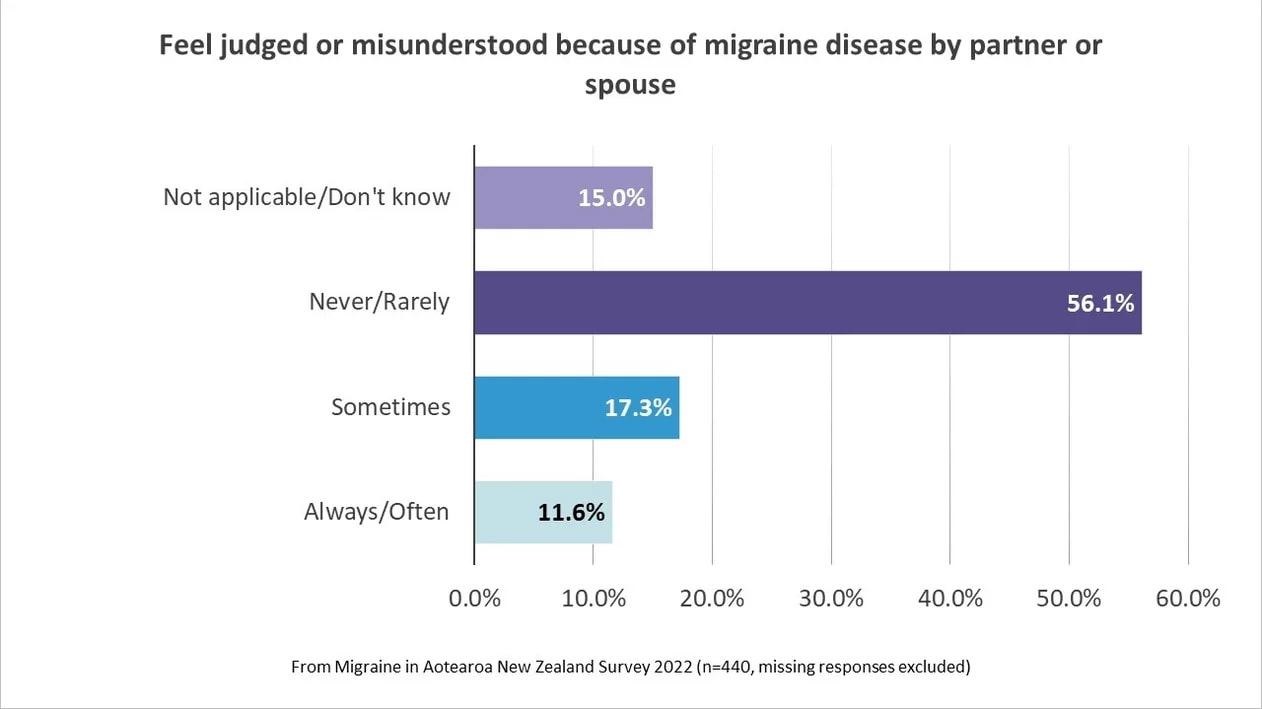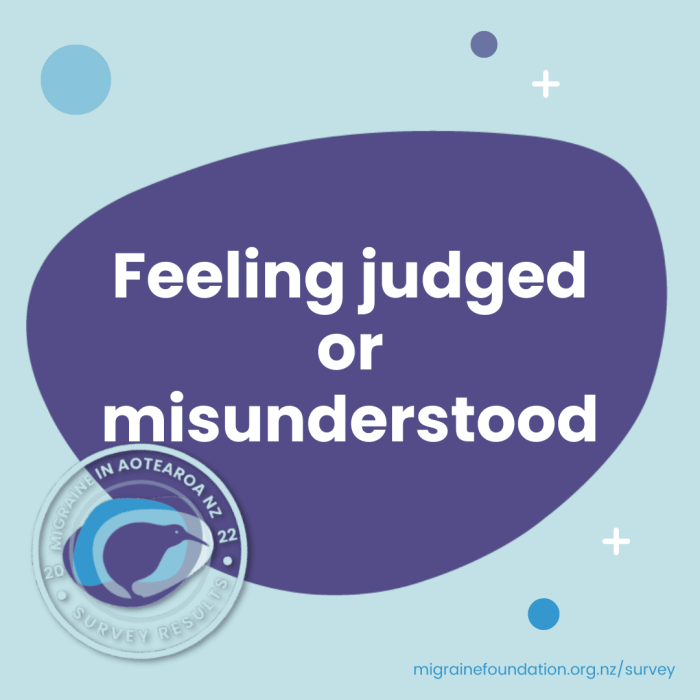Results from the Migraine in Aotearoa New Zealand Survey 2022
It’s bad enough living with a chronic neurological condition that causes unpredictable attacks of pain, nausea, fatigue and brain dysfunction for no apparent reason. It’s even worse when the people you love and live with are not supportive when these attacks happen.
Migraine is one of those diseases that is commonly misunderstood, with people believing that it is ‘just a headache’ and underestimating the disability associated with migraine attacks, especially when these are frequent. That misunderstanding can extend to the partners and spouses of those with migraine.
From the survey, nearly 30% (from 440 respondents) reported feeling judged or misunderstood because of their migraine disease by a partner or spouse, at least some of the time. That increased to over a third if people who answered ‘not applicable’ or ‘don’t know’ were excluded. Although it’s encouraging that over half to two-thirds of people never felt judged or misunderstood by their partners, that leaves a lot of people who did.

In other research, a third of people with migraine thought they would be better partners if they didn’t have migraine disease; and partners appeared to agree, with 29% feeling that arguments were more common because of headaches, and many reporting other negative effects on the relationship.¹
Feeling judged and misunderstood because of a disease can be a result of public or social stigma, where people with migraine are discredited, disbelieved and devalued because they are not behaving in line with social norms.² It’s socially expected that you go to work or school every day and perform to a certain standard, that you do your share of household chores and childcare, that you engage in social activities. It’s not socially acceptable that you randomly have to lie in a dark room, vomit in the bathroom and miss meetings, events and meals because of capricious migraine attacks.
This social stigma can lead to judgment from partners – but the feeling of judgment can also be driven by internalised or self-stigma, where the person with migraine themselves starts to believe they are less worthwhile and less valuable because of their disease.³
Experiencing stigma can actually worsen the disability from migraine² and it’s not hard to understand why. The stress of living with someone who judges and misunderstands your disease could make attacks more likely and more severe.
There are a few things we can do to reduce stigma in our relationships. We can ask our partners to educate themselves about migraine disease and tell them about what migraine is like for us – how it affects us and what they can do to help us. We need to have these conversations when we are well and not in the middle of an attack, especially when attacks impair our ability to think and talk. Just the shared understanding that migraine is a neurological condition, like epilepsy, and that we can’t control when attacks occur, can lessen some of the blame and judgment.
If your partner persists in being unsupportive and judgmental, you may want to reconsider whether this is a healthy relationship to be in or whether this is a sign of deeper issues that need to be worked on.
But let’s celebrate all those people who never made their partners with migraine feel judged or misunderstood. That shows what’s possible. That’s love in action. That gives us all hope for a future society where the stigma against people with migraine no longer exists.
Find out more about migraine disease
- About migraine, Migraine Foundation Aotearoa New Zealand
- Migraine 101: What you should know, American Migraine Foundation
- What is migraine? Association of Migraine Disorders
- Migraine, Migraine and Headache Australia
References
- Lipton, R. B. et al. The Family Impact of Migraine: Population-Based Studies in the USA and UK. https://doi.org/10.1046/j.1468-2982.2003.00543.x 23, 429–440 (2016).
- Seng, E. K. et al. The unique role of stigma in migraine-related disability and quality of life. Headache: The Journal of Head and Face Pain 00, 1–11 (2022).
- Perugino, F., de Angelis, V., Pompili, M. & Martelletti, P. Stigma and Chronic Pain. Pain and Therapy 2022 1–10 (2022) doi:10.1007/S40122-022-00418-5.


